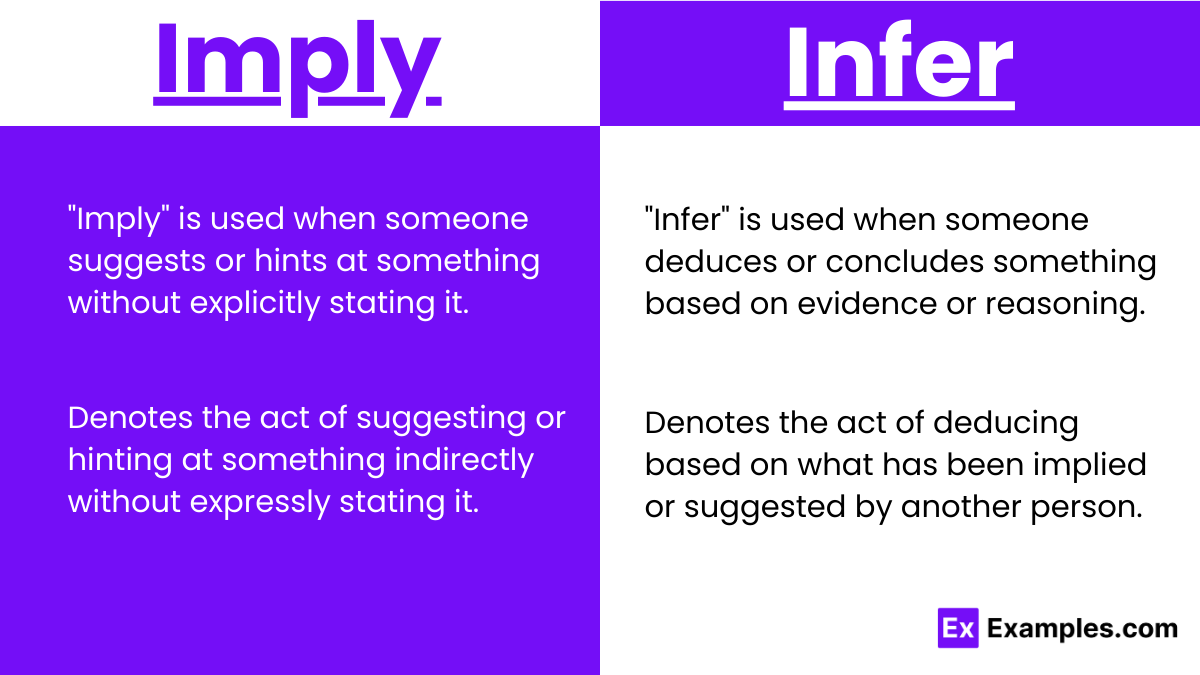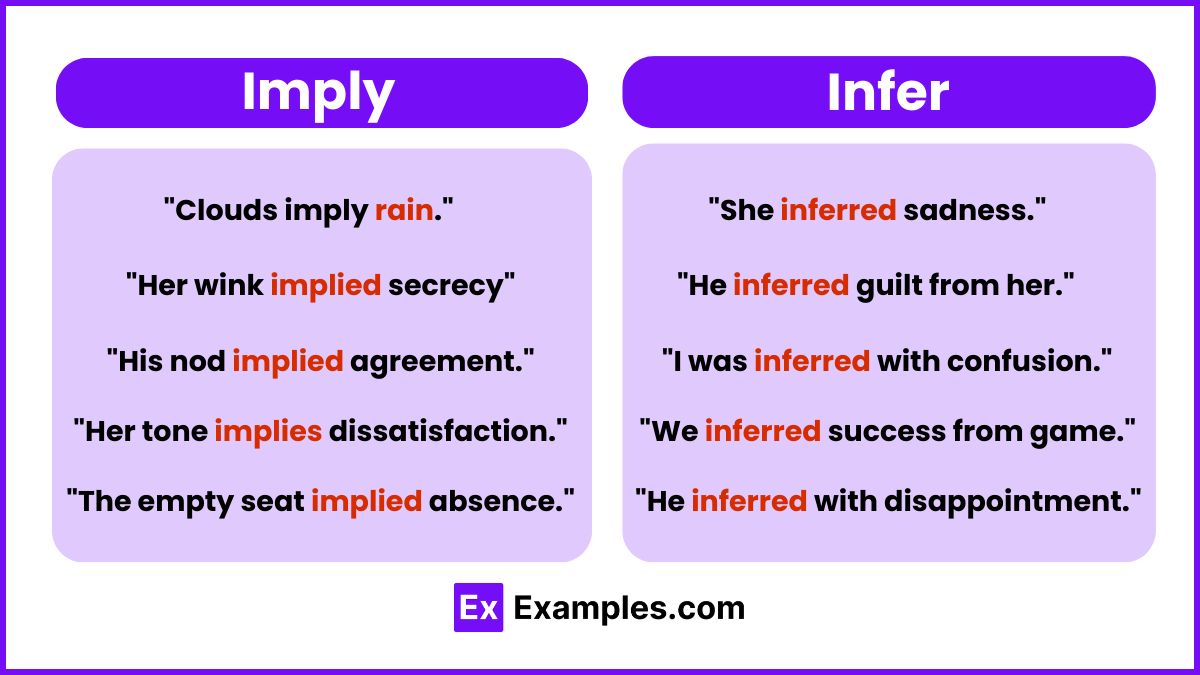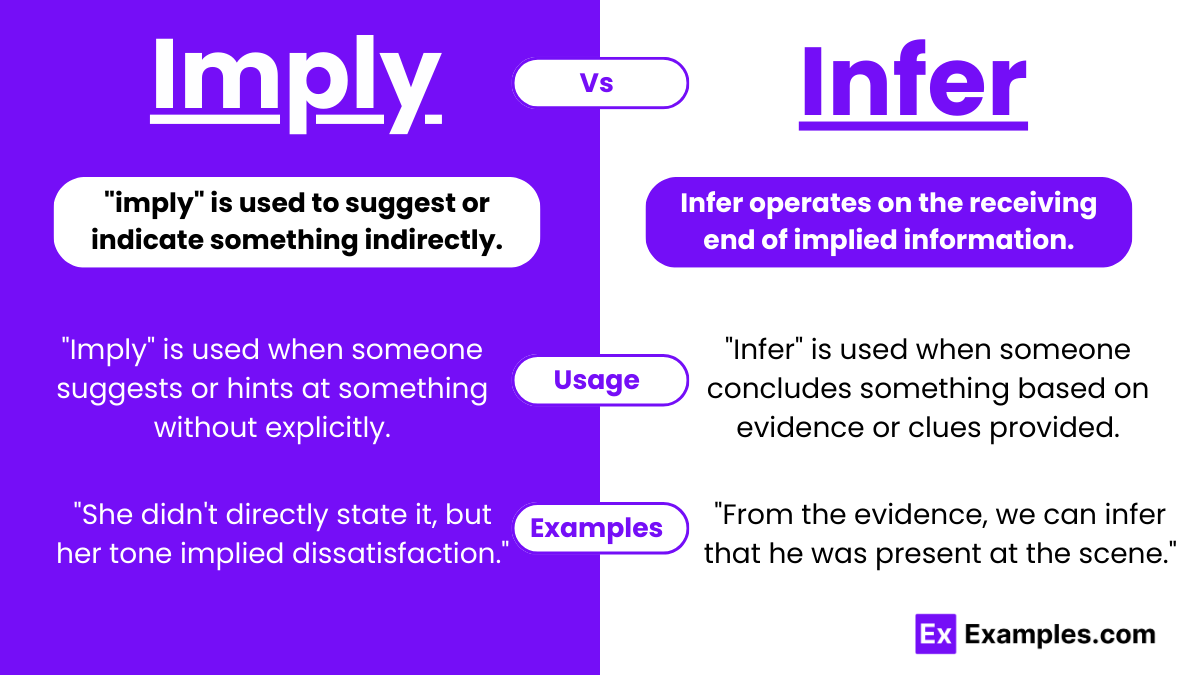Imply vs Infer
These two words, often used interchangeably, actually carry distinct meanings that are crucial to clear communication. Imagine a conversation where one person is implying something, subtly hinting at information, while the other person is inferring, interpreting what is being implied. It’s like a delicate dance of giving and receiving information. We’ll cut through the confusion and provide a straightforward explanation of the difference between “infer” and “imply.”
Imply and Infer – Meanings
- “Imply” is typically used as verb that is used to suggest or indicate something indirectly, without explicitly stating it. It’s like giving a hint or making an inference without directly expressing it.
- “Infer” is also typically used as a verb, but it operates on the receiving end of implied information. When you infer something, you’re drawing a conclusion or making an educated guess based on evidence or hints provided by someone else.
Summary
“Imply” means to suggest or indicate something without explicitly stating it. The speaker implies information, while the listener infers meaning from the implication. “Infer” refers to drawing conclusions or making deductions based on evidence or suggestions. While “infer” typically follows an implication, it can also be used more broadly to draw conclusions from evidence. However, confusion can arise as “infer” is sometimes mistakenly used interchangeably with “imply.”
How to Pronounce Imply and Infer
- Imply: Pronounced as \im-PLY\, with the stress on the second syllable. It rhymes with “apply” or “reply.”
- Infer: Pronounced as \in-FUR\, with the stress on the first syllable. It rhymes with “sinfer” or “dinner.”
The Difference Between Imply and Infer
| Aspects | Imply | Infer |
|---|---|---|
| Action | Implying actions are performed by the speaker or writer to suggest or indicate something. | Inferring actions are carried out by the listener or reader to draw a conclusion or make deductions. |
| Linguistic Role | “Imply” functions as an active verb. | “Infer” operates as a passive verb. |
| Direction | “Imply” involves top-down communication from the speaker/writer to the listener/reader. | “Infer” pertains to bottom-up comprehension from the listener/reader to the speaker/writer. |
| Relationship | “Imply” establishes implicit meaning within a communication. | “Infer” interprets implicit meaning within a communication. |
| Perspective | “Imply” expresses the intention or implication of the speaker/writer. | “Infer” deciphers the intention or implication by the listener/reader. |
How to Remember the Difference
- Imply: Think of “imply” as speaking or suggesting something indirectly. When you imply, you’re giving a hint or suggesting without directly stating it. The key here is the speaker’s action.
- Infer: Think of “infer” as interpreting or understanding something indirectly. When you infer, you’re figuring out or deducing something from clues or information given. The key here is the listener’s or reader’s action.
How to Use Imply and Infer

Imply Usage:
- To convey implications or consequences: Indicating what might happen as a result of certain actions or decisions.
- To express underlying meaning: Conveying subtle messages or subtext.
- To indicate a relationship between ideas or events: Suggesting a connection or correlation between two things.
- To communicate intentions indirectly: Hinting at one’s desires, intentions, or motives without explicitly stating them.
Infer Usage:
- To draw conclusions from patterns or trends: Making logical deductions based on repeated observations.
- To understand implicit instructions or information: Deriving meaning from what is implied rather than explicitly stated.
- To interpret non-verbal cues: Understanding emotions, attitudes, or intentions based on body language, tone of voice, etc.
- To make predictions based on available evidence: Anticipating future outcomes based on current information or trends.
When to Use Imply and Infer
Imply:
- “Imply” is used when someone suggests or hints at something without explicitly stating it.
- It is about the message sender providing information that leads the listener or reader to understand or infer something.
- For example: “She didn’t say it directly, but her tone implied that she was unhappy.”
Infer:
- “Infer” is used when someone deduces or concludes something based on evidence or clues provided.
- It is about the message receiver understanding or deducing something from the information given by the sender.
- For example: “From the evidence presented, we can infer that the suspect was at the scene of the crime.”
Imply and Infer – Examples

Imply Examples
- Base Form (Infinitive): She doesn’t directly state it, but her tone may imply dissatisfaction.
- Present Simple: The advertisement implies that this product boosts energy levels.
- Present Continuous: He is currently implying that there are potential risks involved.
- Past Simple: His silence implied that he didn’t agree with the decision.
- Past Continuous: While they were talking, it was implying that they had reservations.
Infer Examples
- Base Form (Infinitive): From his tone, we can infer his excitement about the upcoming project.
- Present Simple: We infer from the evidence that he is likely the culprit.
- Present Continuous: They are currently inferring that the situation might worsen.
- Past Simple: She inferred from his reaction that he was not pleased with the news.
- Present Perfect: The data we’ve gathered has inferred a correlation between these two variables.
- Future Simple: His absence tomorrow will infer his disinterest in the project.
Synonyms
| Imply | Infer |
|---|---|
| Suggest | Deduce |
| Hint | Conclude |
| Implicate | Gather |
| Indicate | Reason |
| Insinuate | Assume |
Exercise
- She didn’t say it directly, but her tone ___________ that she was upset.
- Based on the evidence, we can ___________ that he is likely to accept the offer.
- His actions seemed to ___________ that he had prior knowledge of the situation.
- The teacher’s instructions clearly ___________ that the assignment was due next week.
- From his reaction, we can ___________ that he was surprised by the news.
Answers:
- imply
- infer
- imply
- imply
- infer
FAQ’S
What is an Example of Imply and Infer?
Example: She implied dissatisfaction through her tone. From his reaction, we inferred his disagreement with the decision.
What is the Difference Between an Implication and an Inference?
Implication refers to a suggestion, while inference is a conclusion drawn from evidence or reasoning.
What is the Difference Between Imply and Implication?
“Imply” is the action of suggesting, while “implication” is the suggested meaning or consequence of something said or done.
Does the Reader Imply or Infer?
Readers infer meaning from text based on context and clues provided by the author. Authors imply ideas, leaving readers to infer.
What is an Example of Imply?
Example: His silence implied disapproval. The advertisement implies quality through its sleek design.
What Makes You Infer?
Evidence, context, and reasoning make us infer. From observations, we infer conclusions not explicitly stated



